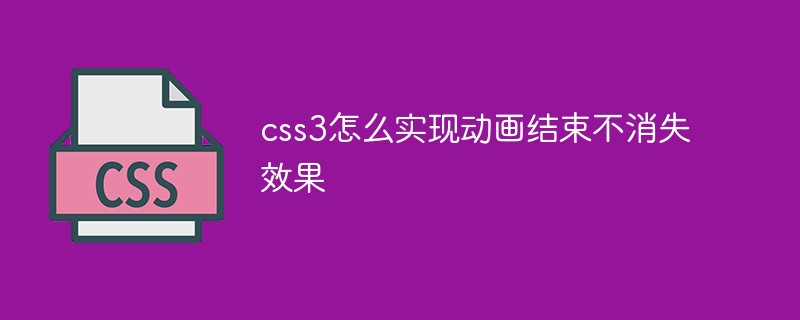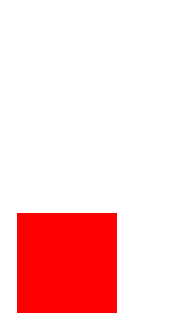 Web Front-end
Web Front-end
 Front-end Q&A
Front-end Q&A
 How to achieve the effect of not disappearing when the animation ends in css3
How to achieve the effect of not disappearing when the animation ends in css3
How to achieve the effect of not disappearing when the animation ends in css3
In css3, you can use the "animation-fill-mode" attribute to achieve the effect of not disappearing when the animation ends. This attribute can specify the style of the element when the animation is not played. When the attribute is set to forwards, the animation effect will not disappear. The syntax is "animation-fill-mode:forwards".

The operating environment of this tutorial: Windows 10 system, CSS3&&HTML5 version, Dell G3 computer.
How to achieve the effect of not disappearing after the animation ends in css3
The animation-fill-mode attribute stipulates that when the animation does not play (when the animation is completed, or when the animation has a delay and does not start playing), The style to apply to the element.
By default, CSS animations will not affect the element until the first keyframe is played, and stop affecting the element after the last keyframe is completed. The animation-fill-mode property overrides this behavior.
CSS Syntax
animation-fill-mode: none|forwards|backwards|both|initial|inherit;
none Default value. Animation does not apply any styles to the target element before or after the animation is executed.
forwards After the animation ends (determined by animation-iteration-count), the animation will apply this property value.
backwards The animation will apply the property value defined in the keyframe that started the first iteration of the animation during the animation-delay definition. These are values in from keyframes (when animation-direction is "normal" or "alternate" ) or in to keyframes (when animation-direction is "reverse" or "alternate-reverse" ).
Both animations follow the rules of forwards and backwards. That is, the animation expands the animation property in both directions.
initial Sets this property to its default value.
inherit Inherit this property from the parent element.
The example is as follows:
<html>
<head>
<meta charset="utf-8">
<title>123</title>
<style>
div
{
width:100px;
height:100px;
background:red;
position:relative;
animation:mymove 3s;
animation-iteration-count:2;
animation-fill-mode:forwards;
/* Safari 和 Chrome */
-webkit-animation:mymove 3s;
-webkit-animation-iteration-count:2;
-webkit-animation-fill-mode:forwards;
}
@keyframes mymove
{
from {top:0px;}
to {top:200px;}
}
@-webkit-keyframes mymove /* Safari 和 Chrome */
{
from {top:0px;}
to {top:200px;}
}
</style>
</head>
<body>
<p><strong>注意:</strong>Internet Explorer 9 及其之前的版本不支持 animation-fill-mode 属性。</p>
<div></div>
</body>
</html>Output result:

(Learning video sharing: css video tutorial)
The above is the detailed content of How to achieve the effect of not disappearing when the animation ends in css3. For more information, please follow other related articles on the PHP Chinese website!

Hot AI Tools

Undresser.AI Undress
AI-powered app for creating realistic nude photos

AI Clothes Remover
Online AI tool for removing clothes from photos.

Undress AI Tool
Undress images for free

Clothoff.io
AI clothes remover

AI Hentai Generator
Generate AI Hentai for free.

Hot Article

Hot Tools

Notepad++7.3.1
Easy-to-use and free code editor

SublimeText3 Chinese version
Chinese version, very easy to use

Zend Studio 13.0.1
Powerful PHP integrated development environment

Dreamweaver CS6
Visual web development tools

SublimeText3 Mac version
God-level code editing software (SublimeText3)

Hot Topics
 1378
1378
 52
52
 How to write split lines on bootstrap
Apr 07, 2025 pm 03:12 PM
How to write split lines on bootstrap
Apr 07, 2025 pm 03:12 PM
There are two ways to create a Bootstrap split line: using the tag, which creates a horizontal split line. Use the CSS border property to create custom style split lines.
 The Roles of HTML, CSS, and JavaScript: Core Responsibilities
Apr 08, 2025 pm 07:05 PM
The Roles of HTML, CSS, and JavaScript: Core Responsibilities
Apr 08, 2025 pm 07:05 PM
HTML defines the web structure, CSS is responsible for style and layout, and JavaScript gives dynamic interaction. The three perform their duties in web development and jointly build a colorful website.
 How to insert pictures on bootstrap
Apr 07, 2025 pm 03:30 PM
How to insert pictures on bootstrap
Apr 07, 2025 pm 03:30 PM
There are several ways to insert images in Bootstrap: insert images directly, using the HTML img tag. With the Bootstrap image component, you can provide responsive images and more styles. Set the image size, use the img-fluid class to make the image adaptable. Set the border, using the img-bordered class. Set the rounded corners and use the img-rounded class. Set the shadow, use the shadow class. Resize and position the image, using CSS style. Using the background image, use the background-image CSS property.
 How to use bootstrap in vue
Apr 07, 2025 pm 11:33 PM
How to use bootstrap in vue
Apr 07, 2025 pm 11:33 PM
Using Bootstrap in Vue.js is divided into five steps: Install Bootstrap. Import Bootstrap in main.js. Use the Bootstrap component directly in the template. Optional: Custom style. Optional: Use plug-ins.
 How to resize bootstrap
Apr 07, 2025 pm 03:18 PM
How to resize bootstrap
Apr 07, 2025 pm 03:18 PM
To adjust the size of elements in Bootstrap, you can use the dimension class, which includes: adjusting width: .col-, .w-, .mw-adjust height: .h-, .min-h-, .max-h-
 How to set up the framework for bootstrap
Apr 07, 2025 pm 03:27 PM
How to set up the framework for bootstrap
Apr 07, 2025 pm 03:27 PM
To set up the Bootstrap framework, you need to follow these steps: 1. Reference the Bootstrap file via CDN; 2. Download and host the file on your own server; 3. Include the Bootstrap file in HTML; 4. Compile Sass/Less as needed; 5. Import a custom file (optional). Once setup is complete, you can use Bootstrap's grid systems, components, and styles to create responsive websites and applications.
 How to use bootstrap button
Apr 07, 2025 pm 03:09 PM
How to use bootstrap button
Apr 07, 2025 pm 03:09 PM
How to use the Bootstrap button? Introduce Bootstrap CSS to create button elements and add Bootstrap button class to add button text
 How to view the date of bootstrap
Apr 07, 2025 pm 03:03 PM
How to view the date of bootstrap
Apr 07, 2025 pm 03:03 PM
Answer: You can use the date picker component of Bootstrap to view dates in the page. Steps: Introduce the Bootstrap framework. Create a date selector input box in HTML. Bootstrap will automatically add styles to the selector. Use JavaScript to get the selected date.



